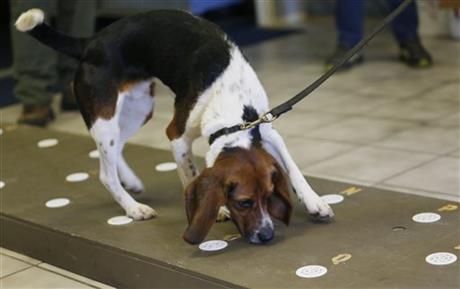
By DAN SEWELL
FILE – In an Oct. 28, 2013 file photo, Elvis, a 2-year-old beagle, sniffs polar bear protein samples at Iron Heart Performance Dog Center in Shawnee, Kan. Confirming pregnancies of the massive bears, a threatened species, has been difficult, and zoo officials say knowing can help make sure they and the Mama bears are ready for birthing and raising cubs. Elvis is demonstrating 97% accuracy in positive identification of samples from pregnant females. (AP Photo/Orlin Wagner, File)
Beagle Polar Bears
FILE – In this Feb. 22, 2007 file photo provided by SeaWorld San Diego, a polar bear named Szenja plays with an enrichment device at the attraction in San Diego, Calif. A two-year-old beagle named Elvis, who has been trained to sniff fecal samples from polar bears to determine if they might be pregnant, agrees that Szenja may be expecting, say officials at SeaWorld San Diego. Zoos around the country provided fecal samples that the 2-year-old dog named Elvis has been trained to sniff for proteins that scientists say are found only from pregnant polar bears. (AP Photo/SeaWorld San Diego, File)
Beagle-Polar Bears
FILE – In a Monday, Oct. 28, 2013 file photo, Elvis, a 2-year-old beagle, sniffs polar bear protein samples at Iron Heart Performance Dog Center in Shawnee, Kan. Zoos around the country provided fecal samples that Elvis had been trained to sniff for proteins that scientists say are found only from pregnant polar bears. Elvis is demonstrating 97% accuracy in positive identification of samples from pregnant females. (AP Photo/Orlin Wagner, File)
Beagle-Polar Bears
FILE – In a Monday, Oct. 28, 2013 file photo, Polar bear protein samples await testing by Elvis, a beagle at Iron Heart Performance Dog Center in Shawnee, Kan. Zoos around the country provided fecal samples that Elvis had been trained to sniff for proteins that scientists say are found only from pregnant polar bears. Elvis is demonstrating 97% accuracy in positive identification of samples from pregnant females. (AP Photo/Orlin Wagner, File)
Prev
1 of 4
Next
CINCINNATI (AP) — A specially trained beagle’s smell test for polar bear pregnancies predicts there will be few new cubs for U.S. zoos this year — although a romantic trip to Pittsburgh apparently turned out well for a female bear in San Diego.
Animal conservation scientists at the Cincinnati Zoo worked with a dog trainer in Kansas to devise the test being tried out this year. Zoos around the country provided fecal samples that the 2-year-old dog named Elvis has been trained to sniff for proteins that scientists say are found only from pregnant polar bears.
Erin Curry of the Cincinnati Zoo’s Center for Conservation & Research of Endangered Wildlife said that with nearly all samples from 14 zoos checked, the Elvis test indicates this year’s cub class will be similar to last year’s, when only three cubs were born in U.S. zoos.
“Probably about the same,” Curry said. “We’re still waiting on a few (results).”
Confirming pregnancies in the massive bears has been difficult, and zoo officials say knowing would help them manage the threatened species. They can provide dens with extra bedding, step up video monitoring and line up staff and volunteers for around-the-clock “cub watches.”
Curry said Elvis detected no pregnant polar bears at the Cincinnati Zoo, but she declined to divulge results for other facilities. She noted that expectant bears can have one to three cubs per pregnancy. Last year, twins were born at the Toledo Zoo, while the other birth occurred at the Buffalo Zoo.
Curry said any cubs born this year would likely arrive over the next several weeks.
Officials at SeaWorld San Diego said they’re getting ready for the pitter-patter of little paws.
“A Polar Bear Cub May be on the Way!!!” SeaWorld announced Monday on its Facebook page. The posting said 18-year-old Szenja is “showing strong signs of maternity,” such as weight gain, finicky eating and making a nest in her den — and that Elvis thinks so, too. Szenja made a breeding visit to the Pittsburgh Zoo earlier in the year.
Columbus Zoo spokeswoman Jennifer Wilson said Elvis doesn’t think its female polar bears are pregnant, but zoo staffers are monitoring Aurora and Anana in their dens just in case, “since the dog is not 100 percent accurate.”
Curry said Elvis was 97 percent accurate in trials with control samples from bears including ones that had already given birth. Matt Skogen, a former police officer who runs Ironheart High Performance Working Dogs in Shawnee, Kan., said he’s confident in Elvis’ predictions after months of training.
Curry said if the Elvis test proves reliable, there could be efforts to refine it to see whether it’s possible for the beagle to detect pregnancies in very early stages.
Meanwhile, Elvis’ nose was the bear-er of bad news for the Kansas City Zoo near his home, along with Cincinnati. Both got negative results.
“Every year we’ve been hopeful,” Curry said of Cincinnati’s Berit. The 14-year-old female has yet to birth a cub, and Curry said zoo staffers will meet soon to consider steps to try to increase fertility.



